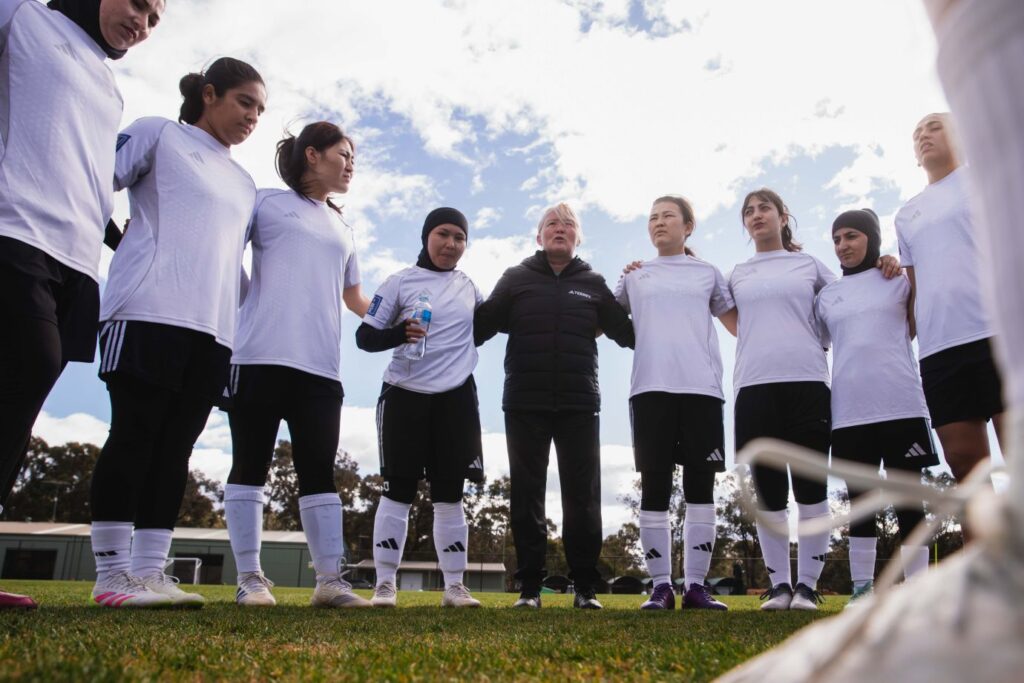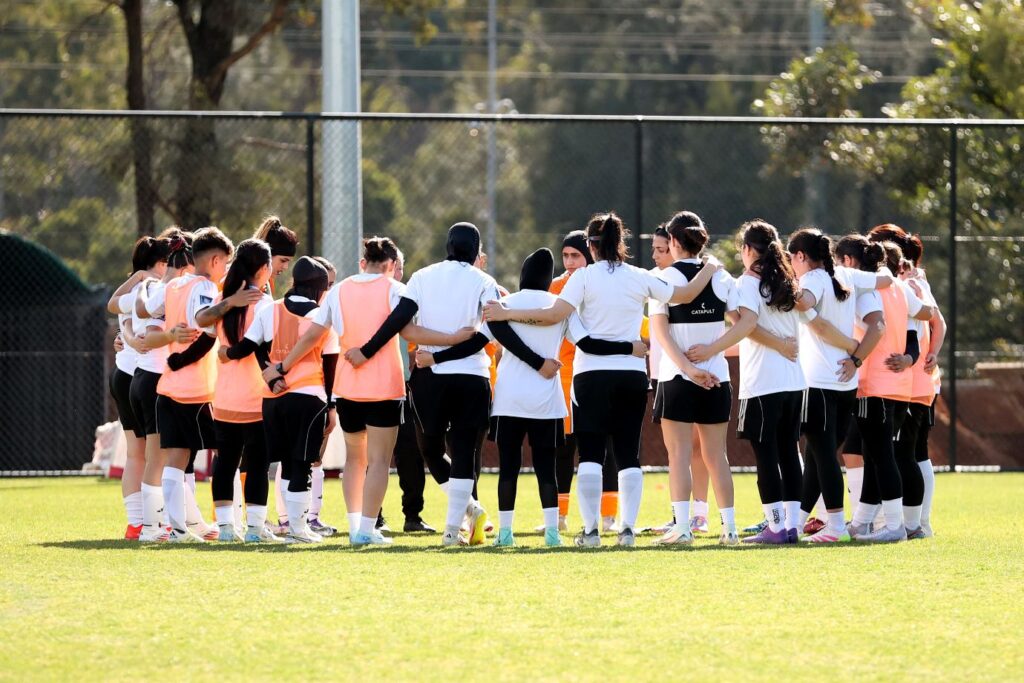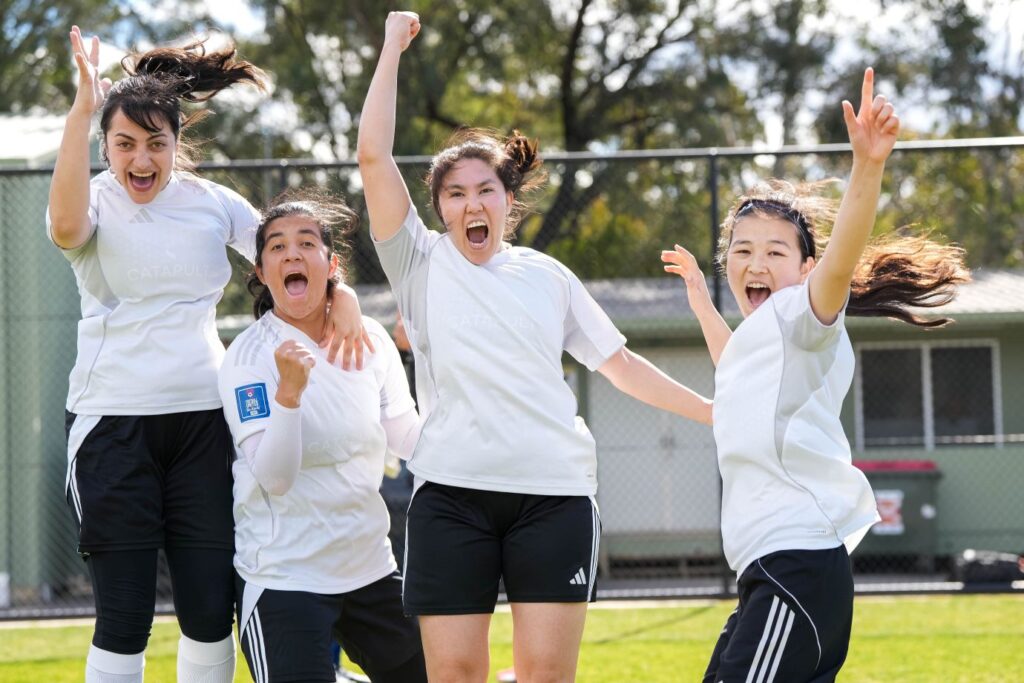Mina Ahmadi, 20, is one of 13 players based in Australia selected in the 23-member squad of the new Afghan Women’s Refugee Team.
The women in the team have been in exile since the Taliban’s takeover of Afghanistan in 2021.
Ahmadi was among those evacuated when the Taliban returned to power and currently lives in Sydney. She’s studying at the University of Technology Sydney and has her sights set on international football once again.
The FIFA-backed Afghan Women’s Refugee Team is about to fly out to Dubai for its first chance of international football for four years – the FIFA Unites: Women’s Series featuring the Afghan Women’s Refugee Team, Chad, Libya and the United Arab Emirates.
The FIFA Unites: Women’s Series will kick off in Dubai on 23 October. According to FIFA, the four team event has been designed to promote and protect the right of all women and girls to play the sport.
Ahmadi was a member of the Afghanistan Women’s National Football Team in the years before the Taliban’s takeover. The team faced threats to their safety before fleeing the country in 2021. She said being able to play again internationally feels like a long time coming.
“In Afghanistan, our football team – we were building something,” she tells Women’s Agenda.
“We were building something to go towards an international tournament, and then it got cut off once the Taliban came, and we got left behind.”
The Afghanistan Football Federation is controlled by the Taliban and will not recognise a women’s football team.

Ahmadi said she used to have an “indescribable feeling” when she was on the field representing Afghanistan before the Taliban’s resurgence in 2021.
“I cannot describe the feeling that I had when I was on the field representing Afghanistan at the time, hearing the anthem, the flag, and going there representing all the Afghan goals on the field,” she says.
“And once it was taken away from us…I thought I needed to get that back. I need to get back on that field.”
Football as freedom
Ahmadi first fell in love with football when she was a girl, playing on her local streets with the boys. She later discovered a local girls’ team at the age of 14 and never looked back.
“I started improving faster than I expected…and then I just fell in love with it. Once you’re good at something and you enjoy it, you just keep improving. So that’s why I fell in love with soccer, and how it made me feel freedom,” she said.
Since living in Australia, Ahmadi has been playing football for Banksia Tigers and Bankstown Lions FC.
Preparing for the upcoming FIFA Unites: Women’s Series has been bittersweet. Ahmadi is painfully aware of the injustices facing women and girls back in Afghanistan.
Since 2021, the rights of women and girls have been systematically stripped away. Today, women and girls are unable to play sports, have been banned from secondary and higher education, most jobs and public spaces like parks and gyms.
Speaking to the women and girls back home in Afghanistan, Ahmadi says: “I just want them to know that we understand them, and we hear them, and we know that gender discrimination in Afghanistan is a real thing, and it’s happening now.”
“We want to be a voice. We are trying to fight for their freedom and fight for our freedom, for the world to see us… recognise [us] and let them be free and let us be free.”

Looking forward
Ahmadi says the past few years living in Australia have been an adjustment.
“Moving to a different country is never easy for anyone,” she explains.
“Completely leaving what you already had behind, and then moving to another country…it’s very hard to adjust yourself to.
“Soccer wise, the levels and the style of play in Afghanistan and Australia [are] very different. So when I first came to Sydney, when I first started to look for teams, it was hard because I had no connections.”
As she prepares to head out to Dubai for the tournament, Ahmadi says it’s an important milestone and will help bring the plight of Afghan women and girls to the world.
“I’ve been trying so hard, praying to be on the [refugee] team, not just because of me, because of all the girls who tried so hard and because of all the girls that are back home and cannot do anything,” she said.
“I know it’s not a national team title, but it’s still allowing us to go up there, being on that field, representing Afghanistan.
“It may not seem like the actual thing that we’re looking for, but for us being there, and for every girl in Afghanistan seeing us, that we did it, it’s a big thing.”
Defender Kereshma Abasi, who is also based in Australia, said the opportunity to play international football again represents a “new beginning”.
“A chance to rewrite my story, show my dedication, and proudly represent Afghanistan on the world stage,” Abasi said.
“It is not just about football; it is about inspiring others and proving that with hard work and resilience, anything is possible.”


